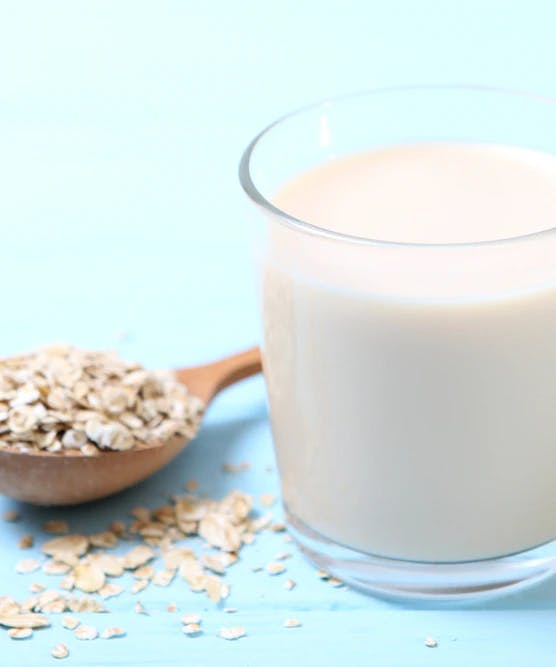Is Oat Milk Really A Good Milk Alternative?
First came rice milk, then soy, almond, hemp, coconut, cashew, and now oat milk. People love it for its slightly sweet taste and delightfully creamy texture. But is oat milk really a nutritious alternative to cow’s milk? Or are we just fooling ourselves into thinking it is?

I spoke with several nutrition experts to uncover the truth behind the oat milk fad.
Is Oat Milk Actually Healthy?
Molly Rieger, RD and Wellness Advisor for Love Wellness, tells me that oat milk is a great alternative to dairy, but should only be consumed in small amounts. “While I love an oat milk latte from time to time or a splash of oat milk in my coffee, I don’t recommend consuming large amounts of oat milk daily. Most of the store-bought brands and those used in coffee shops are high in sugar and carbohydrates,” she says.
Most of the store-bought brands and those used in coffee shops are high in sugar and carbohydrates.
Rieger notes that one cup of oat milk has approximately 120 calories. “It has more carbs and less protein than soy milk or dairy milk. I would keep that in mind if you use it in lattes or smoothies,” she says.
Beware If You Have Digestive or Inflammation Issues…
Jessica Suchan, who is a nutrition coach, shares that many people avoid cow's milk because it can create inflammation in the body (skin flare-ups, digestive issues, etc.). So they end up drinking alternatives instead, such as oat milk. But that's not the best idea either. “Switching to oat milk is not necessarily the best alternative because you are sort of trading one inflammatory milk for another," she explains.
The additives in oat milk can also cause inflammation. “Additionally, the second or third ingredient in most oat milks is rapeseed oil (i.e. canola oil) which is pretty inflammatory!” she says.
The additives in oat milk can also cause inflammation.
Suhan also reveals that oat milk isn’t a great idea if you’re sensitive to gluten. “If the oats are not certified gluten-free and organic, there is a high chance they could be cross-contaminated and create issues for someone with gluten intolerance and/or be sprayed with pesticides which can mess with your hormones."
What Are Some Important Things To Look For on the Label?
With a variety of oat milks available, it’s important to comparison shop. This is especially important because one of the most popular oat milks, Oatly, isn’t quite as healthy as it appears to be. According to Rieger, “It has 16 grams of carbs and 7 grams of sugar per cup, which is higher than other non-dairy milks. Oatly also has rapeseed oil (which gives it a creamy consistency) that contains erucic acid, a toxic fatty acid.”
With a variety of oat milks available, it’s important to comparison shop among brands.
Cynthia Thurlow, NP, is also not a fan of Oatly because it has fortified vitamins and a lot of sugar. “Their chocolate milk has 16g of sugar in a 1 cup serving and inferior vitamin D2.”
Closing Thoughts
If you like oat milk for lattes and similar beverages, go ahead and enjoy it in small amounts. But if you’re using it as a smoothie base or drinking it on its own, it’s not a great idea, especially since there are so many other healthier alternatives.